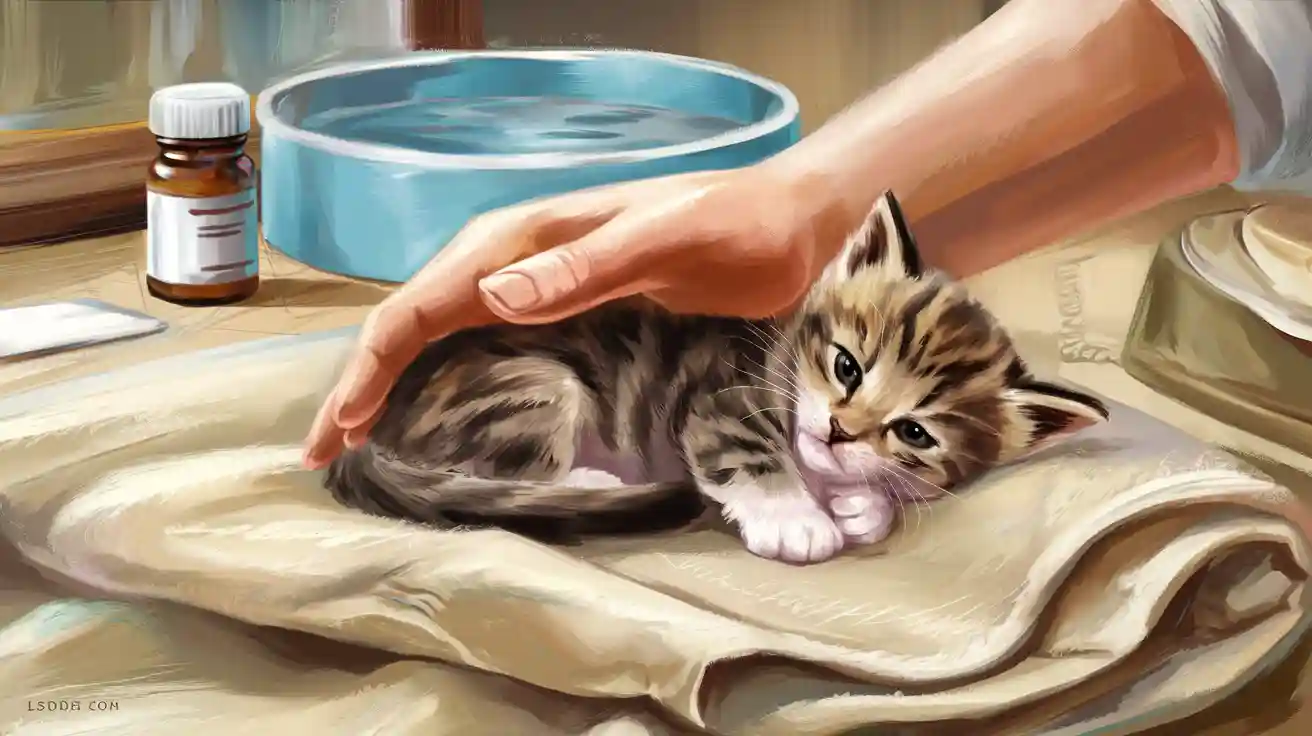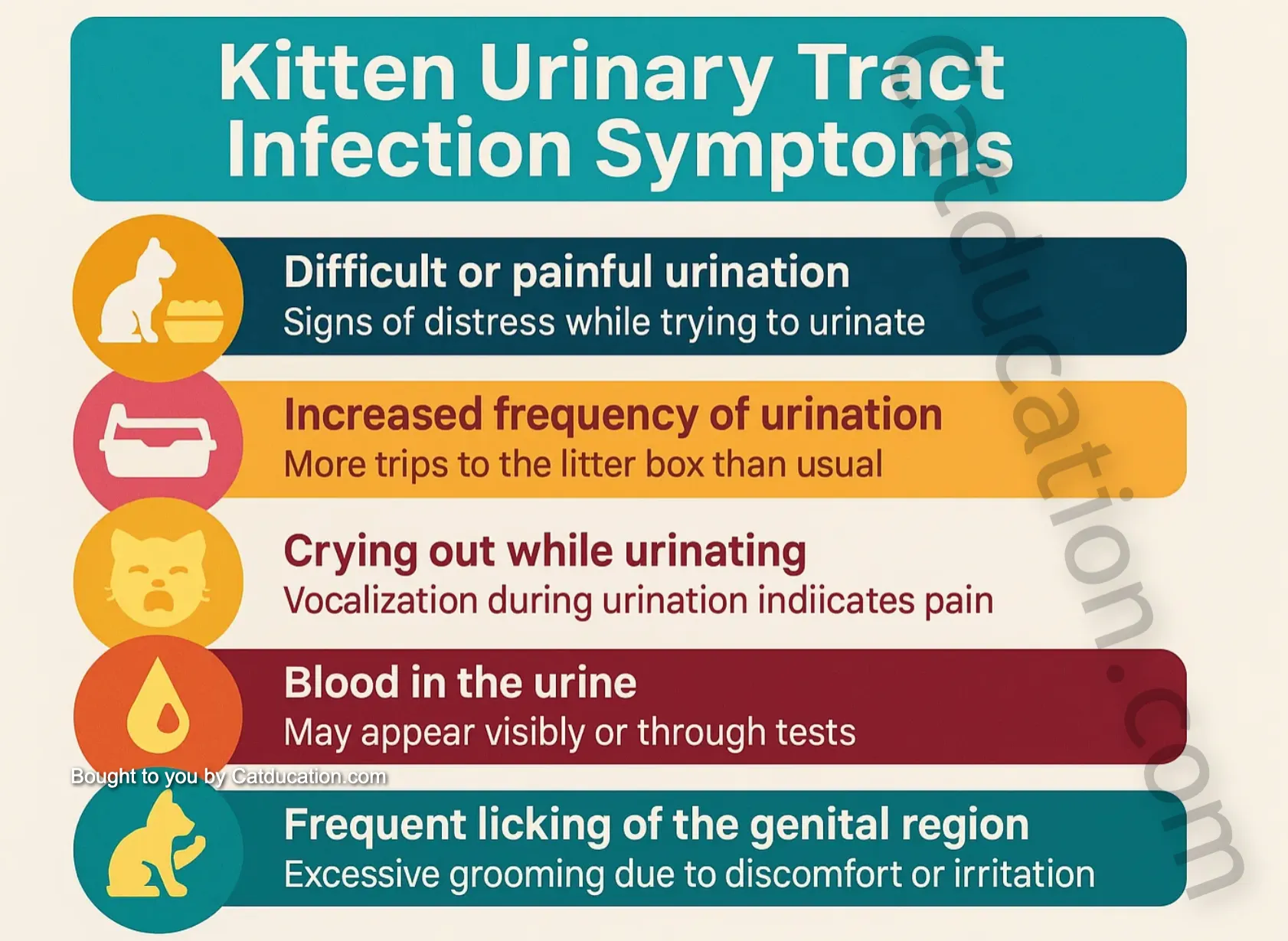
Urinary tract infections can be overwhelming for your kitten, but knowing how to treat kitten urinary tract infection can make a significant difference. Young cats, especially those between 1 to 2 years old, face a higher risk of these infections. Fortunately, about 91% of cases resolve within a week, showing how treatable they are. With timely care and attention, you can help your furry friend feel better faster. Focus on their hydration, comfort, and well-being to support their recovery journey.
Recognizing Symptoms of a Urinary Tract Infection
Physical signs of a UTI in kittens
Spotting physical signs early can make a big difference in your kitten’s recovery. Some common symptoms of cat urinary tract disease include difficult or painful urination, frequent urination, and blood in urine. You might notice your kitten crying out while urinating or straining to urinate.
These signs often indicate discomfort caused by urinary tract problems.
A helpful way to identify these symptoms is by observing your kitten’s litter box habits. Increased frequency of urination or urinating outside the litter box are red flags. Excessive licking of the genital area is another sign that your kitten may be dealing with urinary tract issues.
The table below summarizes these symptoms for quick reference:
|
Symptom |
Description |
|---|---|
|
Difficult or painful urination |
Signs of distress while trying to urinate. |
|
Increased frequency of urination |
More trips to the litter box than usual. |
|
Crying out while urinating |
Vocalization during urination indicates pain. |
|
Blood in the urine |
May appear visibly or through tests. |
|
Inappropriate urination |
Urinating outside the litter box. |
|
Frequent licking of the genital region |
Excessive grooming due to discomfort or irritation. |
Behavioral changes indicating discomfort
Behavioral changes can also signal urinary tract infections. Kittens may urinate in unusual places like sinks or bathtubs. They might vocalize or make strange sounds when attempting to urinate. Acting stressed or avoiding the litter box entirely could mean they associate it with pain.
Other signs include struggling to urinate or producing only small amounts of urine. Excessive licking around the rear end is another indicator of discomfort. If you notice these behaviors, it’s essential to take action quickly to prevent the infection from worsening.
When to seek veterinary care
Some symptoms of urinary tract infections require immediate veterinary care. Straining to urinate, blood in urine, or signs of poor urinary health should prompt a visit to the veterinarian. Early intervention can prevent complications and improve outcomes. If your kitten shows any of these symptoms, don’t delay. A veterinarian can provide a proper diagnosis and recommend the best treatment plan. Prompt care ensures your kitten gets back to their playful, happy self as soon as possible.

How to Treat Kitten Urinary Tract Infection
Veterinary diagnosis and prescribed treatment
Getting a proper diagnosis is the first step in helping your kitten recover from a urinary tract infection. A veterinarian will examine your kitten and may perform tests like urinalysis or urine culture to identify the cause of the infection.
These tests help determine whether bacteria, crystals, or other factors are contributing to the problem.
Once the diagnosis is complete, the veterinarian will recommend treatment options tailored to your kitten’s needs. For sporadic UTIs, antibiotics that concentrate well in urine, such as amoxicillin or trimethoprim-sulfamethoxazole, are commonly prescribed. These medications target the bacteria causing the infection and typically require a course of 3 to 5 days. Nonsteroidal Anti-inflammatory Drugs (NSAIDs) may also be used to reduce pain and inflammation while waiting for test results.
For recurrent infections, the veterinarian may suggest additional tests to uncover underlying issues. These could include physical examinations, blood tests, or imaging studies to ensure your kitten receives the most effective care.
|
Diagnostic Step |
Purpose |
|---|---|
|
Urinalysis |
Identifies bacteria, crystals, or other abnormalities in the urine. |
|
Urine culture |
Pinpoints the specific bacteria causing the infection. |
|
Imaging studies |
Detects structural issues in the urinary tract. |
|
Blood tests |
Evaluates overall health and checks for related conditions. |
The role of antibiotics in UTI treatment
Antibiotics play a crucial role in treating feline urinary tract disease. These medications work by eliminating the bacteria responsible for the infection, allowing your kitten’s urinary system to heal. Veterinarians often prescribe antibiotics based on the results of diagnostic tests, ensuring the treatment is both effective and safe. Amoxicillin and trimethoprim-sulfamethoxazole are popular choices for treating UTIs in kittens.
These antibiotics are known for their ability to concentrate in the urine, making them highly effective against bacterial infections. The typical duration of antibiotic therapy is 3 to 5 days, which is sufficient for most cases.It’s essential to follow the veterinarian’s instructions when administering antibiotics.
Giving the medication at the recommended times and completing the full course ensures the infection is fully treated and reduces the risk of antibiotic resistance.
Safe home remedies for cat UTI support
While veterinary care is essential, you can also use safe home remedies for cat UTI support to complement the prescribed treatment. Encouraging hydration is one of the most effective ways to help your kitten recover. Fresh, clean water should always be available, and you can try offering wet food to increase fluid intake.
Adding cranberry supplements to your kitten’s diet may also support urinary health. Cranberries contain compounds that prevent bacteria from sticking to the bladder walls, reducing the risk of infection.
Always consult your veterinarian before introducing supplements to ensure they’re safe for your kitten.
Maintaining a clean litter box is another simple yet effective home remedy. A clean environment reduces the risk of bacterial contamination and encourages your kitten to use the litter box regularly. If you’re looking for a cat bladder infection home remedy, try incorporating small amounts of bone broth into your kitten’s meals.
Bone broth is rich in nutrients and can help soothe the urinary tract while promoting overall health.
Supporting Your Kitten’s Recovery
Encouraging hydration and fluid intake
Hydration plays a vital role in your kitten’s recovery from a urinary tract infection. Increasing fluid intake helps dilute urine, reducing its concentration and flushing out harmful bacteria.
This simple step can significantly improve your kitten’s urinary health.
-
Dr. Richard Goldstein, DVM, highlights the importance of water intake for protecting a cat’s urinary system. He recommends that at least 50% of your kitten’s diet should consist of wet food. Wet food naturally contains more moisture, making it an excellent choice for boosting hydration.
-
Canned food is another effective way to increase water intake. It supports urinary tract health by ensuring your kitten stays hydrated throughout the day.
-
Gradual dietary changes are essential when transitioning to a higher moisture diet. This approach minimizes stress and encourages your kitten to adapt comfortably.
Encouraging hydration doesn’t stop at food and water. You can also add small amounts of bone broth to your kitten’s meals. Bone broth is rich in nutrients and provides additional moisture, supporting both recovery and overall health.
Adjusting diet for urinary health
Feeding a wet diet is one of the most effective remedies for improving your kitten’s urinary health. Wet food not only increases hydration but also helps maintain an optimal urinary pH, which is crucial for preventing future infections. Studies show that lowering urine specific gravity (USG) to below 1.030 can significantly reduce the recurrence of urinary issues in cats.
-
Prescription diets designed to promote diuresis have been proven to decrease the recurrence of idiopathic feline lower urinary tract diseases.
-
Maintaining a urinary pH between 6.6 and 7.5 is recommended to prevent calcium oxalate uroliths. This balance discourages bacterial growth and supports bladder health.
-
Switching from dry kibble to wet food improves bladder health by diluting urine and increasing hydration.
When adjusting your kitten’s diet, consult your veterinarian to ensure the changes align with their specific needs. Gradual transitions are key to avoiding digestive upset and stress. Additionally, incorporating nutraceuticals like glucosamine can help protect the bladder lining, further enhancing recovery.
Reducing stress and maintaining hygiene
Stress can exacerbate urinary tract issues in kittens, making it essential to create a calm and comfortable environment. Multi-modal environmental modifications (MEMO) are highly effective in reducing stress and promoting recovery. These changes can include providing quiet spaces, interactive toys, and consistent routines.
|
Evidence Type |
Description |
|---|---|
|
Stress Reduction |
MEMO techniques create a less stressful environment, aiding in recovery. |
|
Environmental Modifications |
Altering the environment reduces stress levels and improves recovery. |
|
Litter Box Management |
Proper hygiene encourages regular urination and reduces stress. |
|
Hygiene Importance |
Clean litter boxes prevent bacterial contamination and promote healing. |
Maintaining hygiene is equally important. A clean litter box encourages your kitten to urinate regularly, which helps flush out bacteria. Scoop the litter box daily and clean it thoroughly at least once a week. Using unscented, soft-textured litter can also make the litter box more inviting for your kitten.
Tip: Place the litter box in a quiet, easily accessible location. This reduces stress and ensures your kitten feels safe using it.
Reducing stress and maintaining hygiene go hand in hand. Together, they create an environment that supports your kitten’s recovery and prevents future urinary issues.
Preventing Future Urinary Tract Infections
Importance of regular veterinary check-ups
Routine veterinary visits are one of the most effective ways to prevent urinary tract infections (UTIs) in your kitten. These check-ups allow your veterinarian to monitor your kitten’s overall health and detect early signs of urinary issues. Regular urinalysis, for example, can reveal potential problems like bacterial infections or kidney diseases before they become severe.
Frequent check-ups also ensure that your kitten receives timely vaccinations and preventive care. This proactive approach reduces the risk of recurring UTIs and keeps your kitten healthy and happy. Aim to schedule a veterinary visit at least once a year, or more often if your kitten has a history of urinary problems.
Tip: Keep a record of your kitten’s medical history, including any past UTIs, to share with your veterinarian during visits.
Proper litter box maintenance
A clean and well-maintained litter box is essential for preventing urinary issues in cats. Dirty litter boxes can discourage your kitten from urinating regularly, which may lead to bacterial buildup and infections.
Scoop the litter box daily and replace the litter entirely at least once a week.
Provide enough litter boxes in your home—one for each cat, plus an extra. Place them in quiet, accessible areas to encourage consistent use. Using unscented, soft-textured litter can also make the experience more comfortable for your kitten.
Choosing a diet that supports urinary health
Your kitten’s diet plays a crucial role in maintaining urinary health. Wet food is particularly beneficial because it increases moisture intake, which dilutes urine and reduces the risk of UTIs. Research shows that diets with higher moisture content lead to larger urine volumes, lowering the likelihood of urinary stone formation.
Look for cat food formulated to maintain a balanced urinary pH. This helps prevent the development of crystals and stones in the urinary tract. If your kitten prefers dry food, consider adding water or bone broth to enhance hydration.
Early detection of a urinary tract infection ensures your kitten receives timely care and avoids unnecessary discomfort. Consulting a veterinarian is essential for accurate diagnosis and treatment. Experts emphasize that delays in seeking medical care can lead to untreated pain and increased costs for caregivers.
|
Evidence |
Description |
|---|---|
|
Diagnostic Necessity |
Diagnosis of FIC requires exclusion of other diseases, emphasizing the need for a veterinarian’s expertise. |
|
Untreated Pain |
Lack of medical care can result in unresolved urinary issues. |
Following the steps outlined in this guide helps you support your kitten’s recovery and reduces the risk of future infections. Regular veterinary check-ups, proper litter box maintenance, and a diet tailored for urinary health create a strong foundation for your cat’s well-being.
Your kitten’s health depends on your proactive care. With the right approach, you can ensure they grow into a happy, healthy cat.

In her previous life, Lisa traveled extensively, both for work and leisure. After the pandemic struck, Lisa locked up her luggage and adopted a cat ever since.
Lisa is now an avid cat lover, she devotes most of her free time serving as butler to her adorable feline at home. When she is not with her cat, she can be seen using her phone sourcing for the latest cat supplies online.


